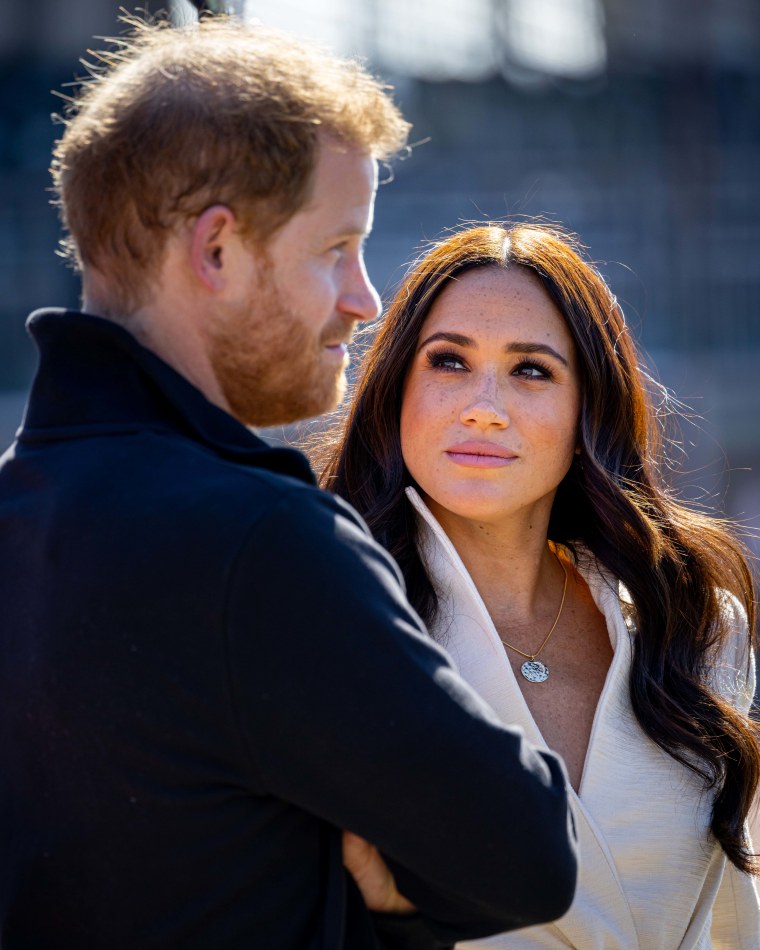
The last three episodes again repeatedly focus on the strain of being in the media spotlight — but this time the couple directly blame the royal institution and accuse the palace of complicity in their treatment.
“They had to believe it was more about us and maybe the issues that we had as opposed to their partner, the media, and their relationship, that was causing so much pain for us,” Harry said of the royal family’s coming to terms with the couple leaving front-line duties.
After media reports suggested William’s alleged bullying had forced the Sussexes out, a joint statement denying this was released by both William and Harry following the Sandringham summit.
But Harry tells the documentary he knew nothing about this.
“I couldn’t believe it. No one had asked me to put my name to a statement like that,” he said. “I called M and she burst into flood of tears, because within four hours they were happy to lie to protect my brother and yet for three years they were never willing to tell the truth to protect us,” he says.
This was the moment, both Harry and Meghan said, they knew they had to leave. Harry said it was ultimately his decision to leave.
Meghan said she “did everything I could to make them proud and to really be a part of the family.” But amid a storm of negative headlines, she said she “wasn’t just being thrown to the wolves, I was being fed to the wolves.”
That line featured in trailers ahead of these final episodes, which promised to be more explosive than the first instalment.
The public certainly appears to be watching.
Netflix said that the first instalment was watched by 28 million households and viewed for more than 81.5 million hours, making it the streaming giant’s highest viewed documentary ever in a premiere week.

The series does not seem to have had much of an impact on views of the couple in Britain, however. A poll released this week by the polling firm YouGov found that 4% of those asked now have a more positive view of the Sussexes, while 14 % now have a more negative view.
The couple’s media output, which also includes a podcast series and a forthcoming book, has been criticized by many in the United Kingdom.
Harry and Meghan are clearly keen to tell the story of their relationship and their rift with the royals from their perspective. The Sussexes’ media company, Archewell Productions, is listed as one of the Netflix show’s three producers.
The series promised to reveal the “truth” about the rift pitting Hollywood glamor against the centuries-old institution.
It comes at an awkward time for the monarchy, three months after Elizabeth’s death and the ascension of Harry’s father, Charles, as the king.
The couple first outlined their side of the story in their bombshell interview with the media mogul Oprah Winfrey last year.
Meghan said then that she had suicidal thoughts, and in the new Netflix series she expands on the mental health struggles she said she went through as a working royal — and the alleged lack of support from the palace.
“I was like, all of this will stop if I’m not here. And that was the scariest thing about it. It was such clear thinking,” she said.
“I wanted to go somewhere and get help but I wasn’t allowed to. They were concerned about how that would look for the institution,” she alleged.
Meghan’s mother, Doria Ragland, tells the docuseries: “I remember her telling that, that she wanted to take her own life. And that really broke my heart.”
NBC News approached Buckingham Palace and Kensington Palace with a series of questions about claims made in the Netflix series, but has not received a response. Neither palace has yet to publicly comment on the series.
Charles said on taking the throne that he wanted “to express my love for Harry and Meghan as they continue to build their lives overseas,” in an apparent attempt to signal a willingness to heal the rift between the monarchy and the Sussexes.
If you or someone you know is in crisis, call 988 to reach the Suicide and Crisis Lifeline. You can also call the network, previously known as the National Suicide Prevention Lifeline, at 800-273-8255, text HOME to 741741 or visit SpeakingOfSuicide.com/resources for additional resources.
 Latest Breaking News Online News Portal
Latest Breaking News Online News Portal





